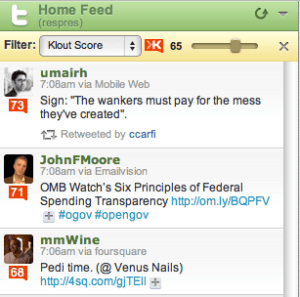Not listening is one of the most common and valuable listening strategies.
 Not listening, or “selective hearing” is the most basic of all listening skills. It is how we’re able to focus on the person we’re sitting with in a crowded restaurant, even though multiple conversations are taking place around us. We filter out what we deem as “noise” in order to get to the “signal” of highest interest.
Not listening, or “selective hearing” is the most basic of all listening skills. It is how we’re able to focus on the person we’re sitting with in a crowded restaurant, even though multiple conversations are taking place around us. We filter out what we deem as “noise” in order to get to the “signal” of highest interest.
It’s a skill we’ve been taught by parents, teachers and significant others from the time we were able to engage in conversation. And, it’s second nature in the face-to-face world. Without this skill, we’d never be able to focus. And it’s one we need to learn again to be an effective listener in the crowded and noisy social spaces that now dominate the internet.
My noise is not your noise.
As I sit in the crowded restaurant, the conversations around me, the ones I block in order to hear my friends, are noise to me. But they are not noise to the people at the other tables. My noise is their signal. Their signal is my noise. We’re not offended by that. We don’t stop going to a restaurant because of the conversations we don’t care about at the tables near us. We simply filter it out and move on with our lives.
Yet, one of the arguments I hear about not fully embracing online social spaces is this: “I don’t want to hear what other people are having for lunch.” And this is where not listening comes in. Because the truth is this; if someone I really care about says something, it’s more important to me than when someone I care less about says the same exact thing. The exact same words can be noise or signal. Noise and signal are determined by context.
We need filters.
Luckily, todays online tools provide us with multiple ways to not listen. There are two different categories of not listening filters on the web, filtering by people or groups of people, and filtering by topics, or keywords.
Filtering by people category.
 Facebook has a form of this kind of tool called “lists.” Lists allow you to segment your friends into different groups, filtering out all of the photos, links and status updates of anyone not on the list. Essentially, it’s the same things as tuning out the noise at the tables around you and listening only to the sound coming from the table you choose to sit at that evening.
Facebook has a form of this kind of tool called “lists.” Lists allow you to segment your friends into different groups, filtering out all of the photos, links and status updates of anyone not on the list. Essentially, it’s the same things as tuning out the noise at the tables around you and listening only to the sound coming from the table you choose to sit at that evening.
My intentions dictate what list I’m going to pay attention to at any given time. Some moments I’m listening to my family list, some my clients list and others my close friends list. Each one contains different people. My intention for listening in each space is slightly different. The context is different. Therefore, my conversation is slightly different in each space. In addition, I can listen to that list only and I can talk to that list only, if I choose. Twitter has a similar list feature built in, and lists on Twitter can be used in the same way.

Other ways to randomly filter by people types are cropping up as well. Not all of them force you to put people into lists. Hootsuite, for example, allows you to filter your personal timeline by Klout score. Allowing you to only hear the signal coming from those who Klout determines to have a high degree of online influence. Of course, this won’t keep you from hearing about @mmWine‘s pedicures, but it does dramatically reduce the noise.
Formulists takes a different approach. Formulists places people into Twitter lists based on behaviors. For example, one of my Twitter lists is automatically generated by Formulists, it is called “who my friends talk to.” This list is created on the fly based on an analysis of who the people I follow on Twitter are talking to the most. They can be public or private. I keep most of mine private. This dynamic form of list creation can take many forms. My favorit is my “new recruits” list, composed of only people I’ve recently followed on Twitter.
Filtering by topic.
Using the restaurant analogy, if I’m at a table with a large group of friends, I’m going to not listen to certain conversations happening at the table. This will typically be based on my interest in the topics. The person to my right may be talking about their kids and the person to my left may be talking about politics. I get to choose which conversation not to listen to and which one to join. The same is true online. I get to pick, what conversations I join.
Twitter allows you to do global monitoring of keywords or hashtags. This is helpful, but limited. Third-party Twitter clients like Hootsuite and Tweetdeck allow you to take it one step further, filtering the conversations of your friends by keywords and other factors.
 Some of the best “tools” for not listening are hidden right in front of our eyes. What I find is that many don’t realize that Facebook has a similar feature built into it’s search function. It allows you to see only the “posts by friends” that relate to any search you perform, as the graphic to the right illustrates. This is an incredibly effective way to hear very selectively.
Some of the best “tools” for not listening are hidden right in front of our eyes. What I find is that many don’t realize that Facebook has a similar feature built into it’s search function. It allows you to see only the “posts by friends” that relate to any search you perform, as the graphic to the right illustrates. This is an incredibly effective way to hear very selectively.
The Key? Define what is noise for you.
Successfully employing a not listening strategy is dependent on identifying what signals you want to pay attention to in any given moment. This is key. It means approaching the online space with the same level of respect you’d give the person sitting across from you at a restaurant. If you’re there to have fun, then have fun. If you’re there to learn, then filter out the noise that isn’t about learning and learn. Do it consciously.
If you have some “not listening” tools or techniques you use, I’d love to hear them in the comments.
This is the first in a five part series of posts on Listening As Strategy.
(Special thanks to @mcinww for his writing on Listening Strategy.)

I love this line, “Define what is noise for you.” Right now I am so into helping people discover their own definitions. So much guru-ism is so much theory and so much theory is so much vapid proclamation. Define success, define engagement, define noise. Love it. Borrowing it to go in my bag of goodies.
Thanks, Ken. Engagement is an art. But it’s not paint by numbers.
You know… when E.F. Hutton speaks…
😉
Not Listening is critical for me.
I wouldn’t be on Twitter if it wasn’t for Lists.
The same with Facebook. Nobody comes into my circle of friends without going on at least one list.
(you are on more than a few of my lists)
* and no, I don’t have a “Bromance” List (yet)
I hope you noticed you mug in one of these images. 🙂
I did. You were “not listening” to my noisy leak.
Can’t wait for the rest of the series!
I would not be on Facebook or Twitter without my lists. Some lists are looked at to see what my friends are doing everyday and others are just there. I may check in occasionally.